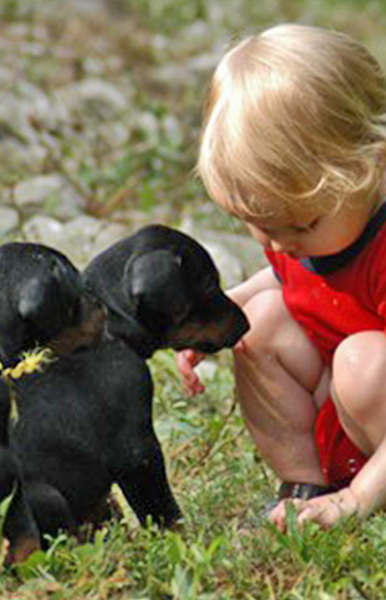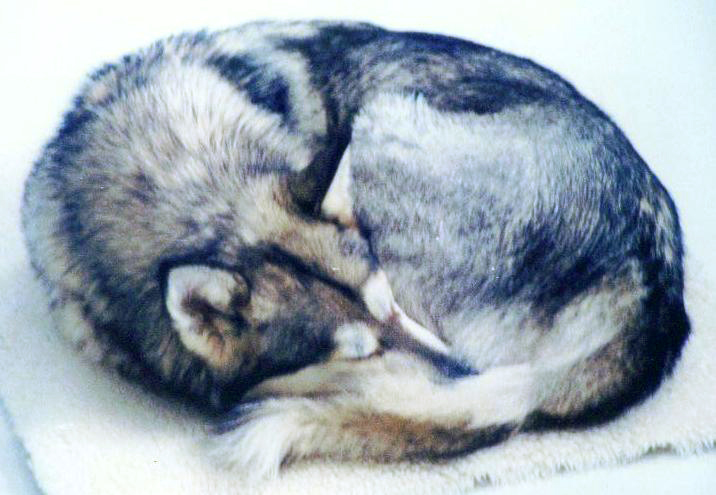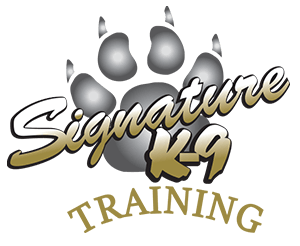
Training Your Canine
Signature K-9 Behavior & Training
Between 8 and 10 weeks of age, while the immune system matures, puppies should be introduced to as many people as possible, in the safety of their home. During this time, it may be a health risk to take puppies to public places, including pet stores. At about 10 weeks of age is a good time to begin training.
Generally speaking, puppies should not leave their litter until at least 7 weeks of age. Some people believe that puppies can leave the litter as soon as they are weaned from their mother. This is not good practice. Puppies learn from their mother and from litter mates. Puppies removed early may miss valuable developmental lessons that can result in behavior problems later.
Although these problems may be dealt with, they can cause frustration that is alleviated by keeping the puppy with his/her litter for the appropriate amount of time. Once the puppy is taken home, is should be sheltered as noted above for about two weeks before beginning training. If, during this home period, the puppy becomes ill, it may mean that the illness started with the breeder. If the puppy remains healthy during this period, you may be fairly sure that nothing has come home from the breeder with your puppy.
Between 4 and 6 months of age, as the young dog moves into adolescence, independence seeking becomes a focus. This independent stage may last for a year or longer, depending on the size and breed of dog. Adolescence is a time when clear communication and training is a must in order to minimize frustration for both dog and human. The earlier this training starts, the better for both.


Typical Topics
All of our programs cover the fundamentals needed for a good relationship. Typical topics include:
- Building a Canine lifestyle
- Socialization & Habituation
- Meeting & greeting strangers
- Handling and inspecting dogs
- Understanding training options
- Basic commands & cues
- Fundamentals of K-9 play
- Use of Symbolism and Rituals
- Genetics and expectations
- Basic food and nutrition
- Elementary grooming & care
- Confidence improvement
- House training & supervision
- Managing dog bite situations
- Equipment types and uses
- Problem solving strategies
Puppy & Young Dog Program
Designed for dogs from ten weeks of age: this is a positive focused program consisting of three private sessions totaling four to six hours contact time. These sessions are scheduled by appointment.
Adolescent & Adult Dogs

Behavior Evaluation…
A one hour session is available to assess your dog’s history and behavior; goals are discussed, questions are answered, suggestions are made, and training options are suggested. Most often, this evaluation session is used when an owner believes the dog has a severe problem. Many times, this session may be omitted and immediate behavior sessions begun.
Private Lessons…
Private lessons may be scheduled as needed to accomplish your goals. They may be purchased in blocks at a discounted price or by the single lesson. Generally, a block of 3or 4 private sessions offers both a better price and a reasonable time period within which a dog owner can evaluate progress. After these initial sessions, some move on to group sessions, others continue with private work, and some have reached a stopping point.
Small Group Sessions…
Small group sessions allow for continued personal coaching. These groups focus on refinement of skills, problem solving and additional skills for use in: competition, temperament testing, therapy dog testing, and the Canine Good Citizen Test. Dogs must have basic manners in place to enter a group. Generally, this means completing the Puppy & Young Dog program or some private lessons. Basic, Intermediate, Advanced, and confidence building (Agility and Distraction) groups are available.
Therapy Dog Preparation Program…
Most dogs with a stable personality can pass the test to do therapy work. Dog handlers are responsible for the preparation of their dog to pass this test. A certified evaluator conducts the test. If desired, owners may seek assistance from professional trainers to help them prepare for the test. Success in preparing for Therapy Dog Certification depends upon a willingness to work between training sessions. If a dog has had little prior training experience, group work may also be helpful.
If You Have Trained Elsewhere…
If you and your dog have had prior training experience and wish to continue your progress, or if you need help with a problem, we will be happy to discuss an appropriate place to enter our program. Generally, this means we meet with you and your dog and do an assessment of status. This helps us to determine the appropriate entry level into our program. This meeting also allows for the discussion of methods in order to insure that trainers and clients will have a mutual understanding before training starts.
